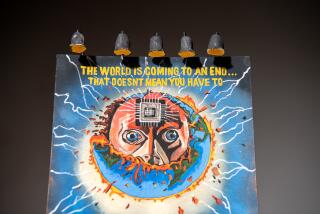With All the Hype, I’m No Fan of the Siecle
- Share via
Is it only me, or does anybody else think the new year is getting old? It’s only the sixth day of January, and already I’m sick and tired of 1998.
Yes, only 359 days left until 1999. Can’t wait, but I suppose there’s no choice.
Come to think of it, I’m already sick and tired of 1999 too. If only we could take all the calendars for this year and next year and build a bonfire. How nice it would be to just fast-forward 724 days to the next century, the new “millennium.”
If those quotation marks signal a certain sarcastic disdain, well, good. That word is another thing I’m sick and tired of.
Let’s get to it already. Let’s party like it’s 1999, and then like it’s 2000. Let’s lift champagne and drink a toast as our computers crash. Let’s throw confetti, whether or not Jesus makes his big comeback. Let’s wear pointy hats as helmets in preparation for Armageddon. Or whatever.
Yes, let’s get it over with. Let the big hangover begin.
Anything to put a fin to the “fin de siecle.”
*
I know what some of you are thinking. Some of you out there are just itching to explain that the next century, the new millennium, won’t really dawn until 2001. You want to say something like: “The year 2000 is really the last year of the 20th century, so the 21st century won’t really arrive until a moment after the stroke of midnight on Dec. 31, 2000. And blah blah blah.”
Don’t do it, OK? Few things about this whole fin de siecle business are as tiresome as the discussion of exactly when the fin is finished and the new siecle begins.
If by chance you don’t know what fin de siecle means by now, congratulations. I don’t mean congratulations for not knowing French, although there may be something virtuous about that. I mean congrats for somehow avoiding or deflecting undue influence by the trendiest phrase of the fin de siecle.
How trendy is it? A Nexis search of the world’s 50 largest English-language newspapers showed this French phrase appeared in 373 articles in 1992. This jumped to 489 in ‘95, dipped to 478 in ‘96, then leaped to 655 last year.
“Millennium,” meanwhile, has gone beyond the merely trendy. It appeared in 199 stories in 1992--and more than 1,000 each year from ’95 to ’97.
Fin de siecle is, as you may have guessed, the French and thus supposedly sophisticated way of saying “end of the century.” If you know how to pronounce it, well, bueno for you.
I probably encountered the phrase in print half a dozen times before I sort of figured out what it meant. The first time I heard it used in conversation, maybe a year ago, I didn’t connect the spoken phrase to the written phrase.
I still can’t pronounce it. I’m trying to find out how, but only out of a sense of journalistic duty. The first three friends who claimed to speak French graciously provided me with three pronunciations. But since then I’ve been led to believe that an English speaker would hear the French pronunciation of fin de siecle as something like: fan duh see EKl.
That’s fan as in “Jack Nicholson is a Lakers fan” and duh as in “Duh.” As for see EKl, that’s sort of like someone saying, “See,” then spotting a giant rat and adding a faint “L” sound so subtle that it’s part of the same syllable. Say it all real fast and you’re practically parlezvousing.
But pardon my French. Personally speaking, I don’t care how it’s pronounced. And remember, it’s not just the phrase that makes me fatigued and nauseated, it’s what it stands for.
I loathe the pretentious prelude to the millennium because it’s all so phony, overhyped, tedious--sort of like saying “end of the century” in French. It’s an excuse for bogus commercialism, bogus scholarship, bogus politics, bogus journalism, bogus history.
The first day of the year 2000--or 2001, if you must--probably won’t be all that significant. New Year’s, for all the parties and gunfire and parades and football games, seldom are rich with meaning. Barring some great coincidence, it won’t go down in history on its own merits. Americans remember July 4, 1776, and Dec. 7, 1941, and Nov. 22, 1963, for good reason. Many people think of “the ‘60s” as beginning with President Kennedy’s assassination and ending with President Nixon’s resignation on Aug. 9, 1974. History really doesn’t pay much attention to the calendar.
No doubt there will be some terrific parties when that night comes along, and I have nothing against terrific parties. But remember that the fin de siecle is not the celebration, it’s the long, drawn-out buildup. In a way, it’s sort of like foreplay. Now, I’m in favor of foreplay. But after a few years of wining, dining and whispering sweet nothings about the millennium, you start wondering if it will be worth all the effort.
Yet at the same time, there’s no denying that fin de siecle, so sophisticated and self-important, so pouty and French, still has her seductive charms. She still lures well-meaning chin-strokers to spend 800 words or so explaining why she really isn’t worth all that ink.
So although I’m sick and tired of it all, I won’t even pretend that heretofore I’ll be able to ignore those come-hither looks. The way I figure it, the year 2000 is still more than a quarter-million words away. So I won’t make a show of being virtuous and making a New Year’s resolution swearing off fin de siecle and “millennium.” No, somewhere down the line, I won’t be able to resist temptation. But I’ll hate myself in the morning.
*
Scott Harris’ column appears Tuesdays, Thursdays and Sundays. Readers may write to him at The Times’ Valley Edition, 20000 Prairie St., Chatsworth, CA 91311, or via e-mail at scott.harris@latimes.com Please include a phone number.
More to Read
Sign up for The Wild
We’ll help you find the best places to hike, bike and run, as well as the perfect silent spots for meditation and yoga.
You may occasionally receive promotional content from the Los Angeles Times.






